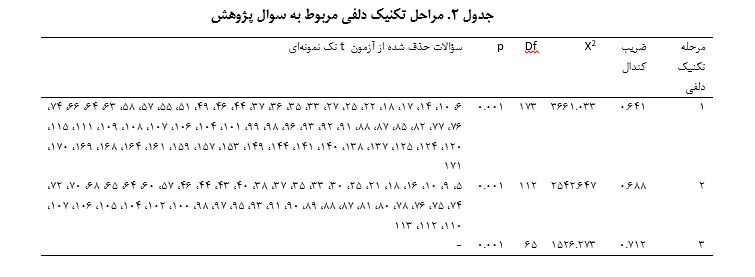شناسایی ابعاد، مولفهها و شاخصهای اخلاق حرفهای مدیران در صنایع کوچک و متوسط
کلمات کلیدی:
اخلاق حرفهای, مدیران, صنایع کوچک و متوسط, تحلیل مضمون, تکنیک دلفی, عوامل سازمانی, عوامل فردیچکیده
این پژوهش با هدف شناسایی ابعاد، مولفهها و شاخصهای اخلاق حرفهای مدیران در صنایع کوچک و متوسط انجام شد. این تحقیق به روش کیفی و با استفاده از تحلیل مضمون صورت گرفت. دادهها از طریق مصاحبههای نیمهساختاریافته با خبرگان حوزه اخلاق و مدیریت سازمانی جمعآوری شد. نمونهگیری بهصورت هدفمند و تا اشباع نظری ادامه یافت. سپس، تحلیل مضمون با استفاده از نرمافزار MAXQDA نسخه 12 انجام شد و برای تأیید نتایج از تکنیک دلفی در سه مرحله با بهرهگیری از آزمونهای آماری کندال و t تکنمونهای با نرمافزار SPSS نسخه 25 استفاده گردید. نتایج نشان داد که اخلاق حرفهای مدیران به پنج دسته عوامل سازمانی، محیطی، زمینهای، ساختاری و فردی تقسیم میشود. در بخش عوامل سازمانی، مولفههایی مانند مقابله با خودمداری و فرهنگ سازمانی قوی شناسایی شد. عوامل محیطی شامل سیاستها و محیط کاری مناسب، و عوامل زمینهای تأثیر محیط اجتماعی و سیاسی را نشان دادند. عوامل ساختاری، اهمیت سبکهای مدیریتی و اعتمادسازی، و عوامل فردی به نقش سلامت روانی و شایستگی فردی تأکید داشتند. ضریب کندال در مرحله سوم تکنیک دلفی 0.712 بود که نشاندهنده هماهنگی مناسب بین نظرات خبرگان است. نتایج این پژوهش نشان میدهد که برای بهبود اخلاق حرفهای مدیران در صنایع کوچک و متوسط، باید به عوامل مختلف سازمانی، محیطی، زمینهای، ساختاری و فردی توجه شود. اجرای سیاستهای شفاف، ارتقای سبکهای مدیریتی مشارکتی و ایجاد محیطهای کاری سالم میتواند به بهبود رفتارهای اخلاقی مدیران کمک کند.
دانلودها
مراجع
Sheikhabadi I, Bagheri M, Jahed H. Identifying the Supervisory Components of Instructional and Educational Leaders
of Primary Schools in order to Providing a Comprehensive Pattern for Iran's Government Education. Sociology of Education.
;10(1):295-304.
Astereki S, Mehrdad H, Ghobadian m. Identifying the components of the model of professional competencies of
educational managers of education organization. Educational Leadership & administration. 2022;2(16):109-34.
Davoodi M. The Relationship Between Professional Ethics And Organizational Socialization Staff Deputy of
Education Ministry of Health And Medical Education. Journal of Medicine Spiritual Cultivation. 2018;26(4):258-71.
Kaffashpoor A, Samanian M, Rahmdel H. Designing and explaining a professional ethics model for the managers of
the banking industry, using the grounded theory strategy. International Journal of Procurement Management. 2021;14(2):230-
Hossein Zadeh I, Ramezani M, Sanginoorpour A, Amari H, Feghi Farahmand N. Competency Model and Ethics with
a Successor Approach in The Banking Industry. Ethics in Science and Technology. 2022;17(2):117-22.
Jafarinahlashkanani F, Eydivandi Z, Shafiei M, Maraghi E, Moradi Kalboland M. Evaluation of the Facilitating and
Inhibitory Factors of Professional Ethics Standards’ Obsrvance in Nursing Care from the Perspective of Nurses. Iranian Journal
of Medical Ethics and History of Medicine. 2020;13(0):155-67.
Ghalavand H, Panahi S, Sedghi S. Opportunities and challenges of social media for health knowledge management:
A narrative review. Journal of Education and Health Promotion. 2020;9(1).
Mousavi A, Mohammadi M, Safian M. Designing a Competency Model for Managers of Organizational Universities
(Case Study: a University Affiliated with a Military Organization). Irainian Journal of Management in the Islamic University.
;9(20):217-40.
Moghadam Nia E, Toloei Ashlaghi A, Afshar Kazemi M. Analysing the Role of Technology Transfer in the
Professional Ethics of Employees. Ethics in Science and Technology. 2020;15(1):162-5.
Shirvani T, Zohrehvandian K. Relationship between Sports Coach Professional Ethics and Self-Efficacy with respect
to Mediating Role of Competence. Human Resource Management in Sport Journal. 2021;8(2):359-77.
Gholipor R, Hassan Gholipour Yasoori T, Taghavi A. A Paradigm Model of Good Corporate Governance Maturity in
the Iranian Insurance Industry. journal of Iranian Public Administration Studies. 2020;3(3):133-59.
Nurhayati I, Khairas EE. Banker Professional Ethics Violation in Banking Business. ECON-Journal of Economics,
Management & Business. 2020;8(3):163-8.
Knapp SJ. Suicide prevention: An ethically and scientifically informed approach. Washington, DC, US: American
Psychological Association; 2020. x, 255-x, p.
Taheri A, Ghazaleh P, Moein H, Masoud. Analysis of the Effect of Professional Ethics on Job Performance and
Organizational Trust with the Mediation of Ethical Climate. Journal of Transformation Management. 2019;11(1):27-56.
Rahmdel H, Samanian M, Kaffashpoor A. Explanation and Presentation of a Model of Professional Ethics for the
Managers of Banking Industry. Bioethics. 2019;9(32):7-18.
Shabani R, Khorshidi A, Abbasi L, Fathivajargah K. Presentation of competency model for primary education
managers of Tehran. Journal of Research in Educational Systems. 2018;12(Special Issue):79-94.
Miri Rami SF, Delgoshaei Y, Mahmoudi AH. Identification and Analysis of Effective Factors on the Strategic
Intelligence of Education Districts Managers of Tehran City and Provide an Appropriate Model. Iranian Journal of Educational
Sociology. 2022;5(1):113-25.

دانلود
چاپ شده
ارسال
بازنگری
پذیرش
شماره
نوع مقاله
مجوز
حق نشر 2024 نشریه پژوهش و نوآوری در تربیت و توسعه

این پروژه تحت مجوز بین المللی Creative Commons Attribution-NonCommercial 4.0 می باشد.










